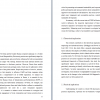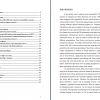Тема: Environmental CSR disclosure in the context of institutional change: The case of Severstal
Закажите новую по вашим требованиям
Представленный материал является образцом учебного исследования, примером структуры и содержания учебного исследования по заявленной теме. Размещён исключительно в информационных и ознакомительных целях.
Workspay.ru оказывает информационные услуги по сбору, обработке и структурированию материалов в соответствии с требованиями заказчика.
Размещение материала не означает публикацию произведения впервые и не предполагает передачу исключительных авторских прав третьим лицам.
Материал не предназначен для дословной сдачи в образовательные организации и требует самостоятельной переработки с соблюдением законодательства Российской Федерации об авторском праве и принципов академической добросовестности.
Авторские права на исходные материалы принадлежат их законным правообладателям. В случае возникновения вопросов, связанных с размещённым материалом, просим направить обращение через форму обратной связи.
📋 Содержание
Introduction 4
1. Theoretical background 7
1.1The difference between CSR, CSRD and corporate sustainability concepts 7
1.2 CSRD in developing and developed countries 9
1.3 Context of Russia 11
1.3.1 History of Russia 12
1.3.2 Systemic companies in Russia 14
1.3.3 CSRD in Russian institutional environment 15
1.3.4 Changes in institutional field in Russia after geopolitical crises in 2022 18
1.4 Neo-institutional theory framework/ institutional theory framework 20
1.4.1 Coercive, normative and mimetic pressures 24
1.4.2 Institutional isomorphism 27
1.4.3 Similarities of institutional theory with stakeholder theory 28
1.4.4 Conclusions from the analysis of institutional theory 31
2.Research design 32
2.1 RESEARCH QUESTIONS STATEMENT 32
2.2 METHODOLOGY 33
2.2.1 Justification of the single case study: 33
2.2.2 Justification for choosing a company: 34
2.3 Data collection 37
3.Findings 39
3.2 Mimetic pressure 43
3.3 Normative pressure 44
4.Result discussions 46
5.Conclusion 51
5.1 Theoretical implications 51
5.2 Practical implications 52
References: 53
Appendix: 62
📖 Введение
As institutional pressures differ from country to country, Russia was chosen for the study due to its unique context, which was formed by the historical and cultural background of both the Soviet Union and the post-Soviet transition period. Dramatic changes related to the geopolitical situation in the world have happened, which affected not only business, but also society and the economy. Therefore, the institutional field also changed. Moreover, Russia represents a country with an emerging economy, with more than 300 systemic companies, originated from the monocities. Most of systemic companies operate in the environmental sensitive industries. For the research the mining and metallurgical industry were chosen. The importance of metallurgy lies in the fact that it serves as a source of foreign exchange earnings to the country, as well as ensures Russia's entry into the world market, which is very important now. The main company in the metallurgy sector is Severstalsystemic company, because of its leader position in profitability. Despite the fact that Severstal is the company, which operates in the sphere with high environmental risks, it manages to establish high environmental standards and follows these standards, which is captured in the sustainability reports that the company regularly posts on its website. All reports comply with the GRI system. International ratings stated that Severstal has a high level of integration of environmental management principles and high level of information disclosure.
At the same time, in Russia there is no legislation, which requires CSR disclosure. Moreover, in the country the pressure from society on corporations is low. Unlike in Western countries, where public pressure has become a driver of CSR, there is practically no such pressure in Russia. And nowadays, the outflow of foreign investors, who force managers to adopt CSR in order to receive the tangible assets. There is no clear driver for Severstal to possess with such a high standard of environmental sustainability practices and high level of disclosure information in sustainability reports.
Therefore, the goal of this paper is to answer the following questions:
1. What institutional factors serve as drivers of adoption of environmental CSR disclosure practice in systemic companies operating in Russia?
2. How have drivers changed in connection with the events of 2022 in Russia?
In this paper, the analysis will be based on the institutional theory, which helps to identify formal and informal pressures that influence the company. In-depth interviews with the representatives of Severstal company will be conducted in order to receive valuable information about the forces of legitimacy which are more important for the business under the condition of the Russian institutional field. A way to collect information through an interview is considered as the most suitable one to receive information from the first hand of people, who have appropriate experience and knowledge, and also have access to the hidden information from the internal stakeholders (O’Dwyer, Unerman, and Bradley 2005). Having done this, the analysis of the collected information will be conducted and the results will be interpreted. Finally, main factors will be identified and the following discussion will be provided.
The subject of the research is the factors influencing companies operating in the Russian market. The object of the research is Severstal company. The presented paper is a single case study. Such an approach was chosen due to the key feature of institutional theory-isomorphism. It is stated that due to isomorphism it can be predicted that companies within the same industry and national boundaries will commit a similar policy(DiMaggio and Powell,1983). Therefore, the thorough analysis of Severstal company, which is considered as one of the global leaders in the mining and metallurgical spheres, will allow us to identify the external institutional drivers influencing the company from the perspective of sustainability practices, including CSR disclosure. Thus, these factors can become the basis for improving the CSR policy in other companies engaged in the mining and metallurgical sector by taking into account pressures, which has not been considered yet. The source of information is secondary and primary data, including in-depth interviews with representatives of Severstal and who possesses information about sustainability initiatives.
The paper is structured in the next order. First, the theoretical framework will be built based on the literature review. In the theoretical background part the discussion about coercive, normative and mimetic isomorphism will be held. Moreover, the peculiarities of the Russian context are considered. After, based on the collected information, the framework will be created, which will be the basis for the in-depth interview questions, as theoretical framework will it will clearly demonstrate some questions, which are the base of this study. Then, the in-depth interview will be conducted and the results will be presented. Finally, the last section of the paper will be dedicated to the discussion of the results.
✅ Заключение
In summary, while the current state of CSRD in Russia reflects a mix of voluntary and coercive influences, the long-term improvement of these practices hinges on a more structured regulatory environment that supports sustainable development and corporate responsibility. Enhancing social involvement in ecological and sustainable agendas is also crucial for fostering a culture of accountability and transparency in Russian businesses.
...





